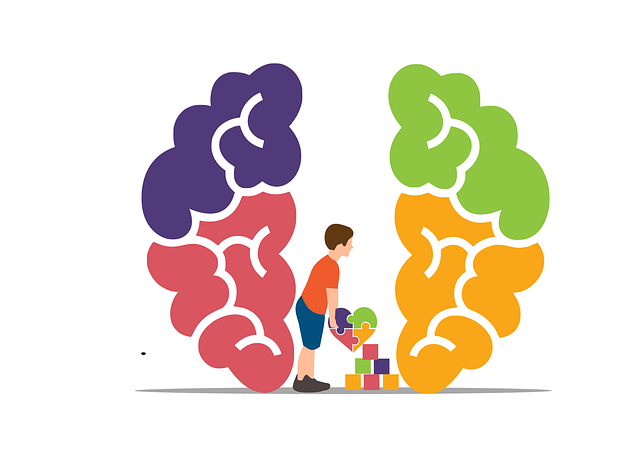Diagnosis and personalized therapy, including Boulder Alcohol Abuse Therapy, are key to managing mental illness. Healthcare professionals use evidence-based techniques for accurate diagnoses, enabling tailored treatment plans. Overcoming barriers to seeking help is crucial; services like Boulder Alcohol Abuse Therapy offer specialized care for dual mental health and substance abuse issues. Their holistic approach combines counseling with programs like stress management workshops, empowering individuals to build resilience and practice self-care for lasting recovery.
Mental illness diagnoses can be complex, often leading individuals on a challenging path. This article offers a comprehensive guide to navigating this process, emphasizing the crucial role of professional therapists in effective treatment. We explore barriers that hinder recovery and provide insights into how Boulder Alcohol Abuse Therapy serves as a holistic support system, offering hope and healing for those seeking mental health assistance. By understanding these aspects, you’ll gain valuable knowledge on overcoming challenges and embracing a brighter future.
- Understanding Mental Illness Diagnoses: Deciphering the Process
- The Role of Professional Therapists in Effective Treatment
- Overcoming Barriers: Navigating the Path to Recovery
- Boulder Alcohol Abuse Therapy: A Comprehensive Support System
Understanding Mental Illness Diagnoses: Deciphering the Process

Mental illness diagnoses can seem like a complex labyrinth to navigate, but understanding the process is a crucial first step for anyone seeking Boulder Alcohol Abuse Therapy or support for their emotional well-being. It begins with recognizing symptoms and concerns, often stemming from changes in mood, behavior, or thought patterns. Individuals might experience heightened stress levels, difficulty managing emotions, or even intense feelings of despair, which can be indicative of various mental health conditions.
The diagnostic process involves thorough evaluations by qualified healthcare professionals who employ evidence-based techniques to assess symptoms and rule out other potential causes. This may include in-depth conversations, questionnaires, and standardized assessments designed to uncover the intricate details of one’s emotional landscape. By understanding these nuances, professionals can accurately decipher whether someone is struggling with anxiety, depression, bipolar disorder, or other mental health challenges, paving the way for effective treatment plans tailored to individual needs.
The Role of Professional Therapists in Effective Treatment

Professional therapists play a pivotal role in effective mental illness treatment and navigation. They provide crucial support and guidance to individuals facing various challenges, from anxiety and depression to more severe conditions like Boulder alcohol abuse. Skilled therapists employ evidence-based practices tailored to each client’s unique needs, fostering a safe space for self-reflection and growth. Through regular sessions, they help patients develop essential coping strategies, enhance self-awareness exercises, and integrate mindfulness meditation into their daily routines.
These professionals not only offer diagnostic clarity but also facilitate access to appropriate treatment modalities. They collaborate with clients to set achievable goals, navigate complex healthcare systems, and ensure continuity of care. By fostering a strong therapeutic alliance, therapists empower individuals to take ownership of their mental health journey, ultimately promoting long-term recovery and improved quality of life.
Overcoming Barriers: Navigating the Path to Recovery

Overcoming barriers is a pivotal step on the path to recovery from mental illness. Many individuals face challenges in seeking help due to stigma, fear of judgment, or lack of awareness about available resources. In a place like Boulder, Colorado, where access to quality healthcare is generally good, understanding how to navigate the system becomes crucial. For instance, Boulder Alcohol Abuse Therapy offers specialized services tailored to address various mental health concerns alongside substance abuse issues.
One effective strategy in overcoming these barriers is developing inner strength and employing conflict resolution techniques. Building resilience helps individuals cope with stressors and setbacks, while learning healthy conflict resolution skills can improve relationships and reduce the risk of burnout. By combining access to professional therapy with personal growth initiatives such as cultivating inner strength and mastering stress management tools, one can create a holistic approach to mental health recovery, ultimately enhancing overall well-being.
Boulder Alcohol Abuse Therapy: A Comprehensive Support System

In Boulder, Colorado, renowned for its vibrant community and stunning natural landscapes, Boulder Alcohol Abuse Therapy stands out as a comprehensive support system for individuals navigating mental illness and substance abuse issues. This specialized therapy focuses on addressing alcohol-related problems head-on, offering a range of services designed to heal the mind, body, and spirit. Beyond traditional counseling sessions, they provide innovative programs like stress management workshops and coping skills development classes, empowering clients with effective tools to manage their mental wellness.
The therapy center recognizes that recovery is a holistic process, which is why their expert coaches also facilitate Mental Wellness Coaching Programs Development. These tailored programs aim to enhance overall well-being by teaching valuable coping strategies, promoting self-care practices, and fostering resilience in the face of life’s challenges. By combining evidence-based treatments with compassionate care, Boulder Alcohol Abuse Therapy serves as a beacon of hope for those seeking transformation and a new path toward lasting recovery and improved mental health.
Mental illness diagnosis and treatment can be a complex journey, but with the right support, recovery is achievable. As discussed in this article, understanding the process of diagnoses, recognizing the value of professional therapists, and overcoming barriers are key steps towards healing. Boulder Alcohol Abuse Therapy serves as an exemplary comprehensive support system, demonstrating how tailored assistance can revolutionize the path to recovery. By navigating these aspects effectively, individuals can access the help they need and lead fulfilling lives.








